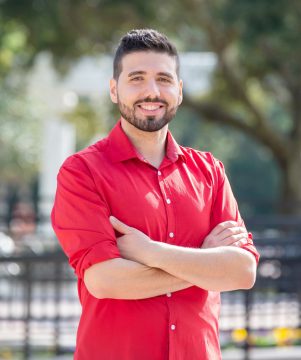Last year, as Michael Hoggard began his third year of medical school, he noticed a common thread in conversations with friends who were medical students throughout the country.
“One friend called me and told me that for the first time in his life he thought he was depressed, and he wasn’t sure he wanted to continue with medical school,” says Hoggard, now a fourth-year medical student at Geisel. “He was embarrassed, and he didn’t know who to talk to about it.”
This troubled but did not surprise Hoggard, who had been researching burnout and depression in medical students. Compared to the general population, medical students experience higher rates of depression, which often goes undiagnosed.

Hoggard originally became interested in burnout and depression in medical students after he joined Reddit’s “r/MedicalSchool” subreddit, an online discussion forum with a community of more than 400,000 current and former medical students. He originally joined the forum for the memes, but after beginning to participate in the group, he noticed an alarming number of students seeking advice from their peers for dealing with feelings of anxiety and depression. He was concerned and motivated to learn more.
Curious about this phenomenon and the quality of advice being given on the subreddit, Hoggard conducted a structured search of the subreddit for terms included in or related to the diagnostic criteria for depression in relevant posts and comments. He then coded the results and conducted a thematic analysis. Five themes emerged: advice seeking (professional implications of a diagnosis of depression), disillusionment (with both medical education and career), testimonials and resources, loneliness (commonly expressed), and humor (mainly used to foster a sense of community and to normalize this common experience.)
“The themes revealed common information gaps that are barriers to students seeking treatment for depression, such as fear of professional impacts, available resources, and the specific needs of medical students during uncertain times,” Hoggard says. “They also show that feelings of depression often peak for students during their first major clinical year when few resources and support are available.”
While many of the students who posted seeking advice reported never having felt depressed, they didn’t know to whom they could turn for help and advice. They felt that friends in other fields could not relate to what they were going through, and they were worried about professional impacts on their licensing or residency prospects if they sought mental healthcare. It became clear to Hoggard that this online forum had advantages that facilitated students being willing to share their experiences and concerns. Among these were a sense of anonymity, which allowed students to share their concerns with less fear of professional impacts, and the perception that other members of the community understood the day-to-day stresses of medical school and had more insight into how this might affect their training or professional prospects.
Medicine has long been a culture that generally ignored burnout (unmitigated stress rather than a clinical condition) and depression though both are inherent to the structure of medical education and residency training and widespread among medical students at all institutions. While there is minimal incentive for the structure to change, medical schools and residency programs are beginning to focus on wellbeing by providing resources to help students and residents cope with both depression and burnout.
Although, Hoggard says, not enough is being done.
“As things currently stand, wellness requirements are generally fulfilled by mandatory wellness lectures during which medical students and residents are told about different ways to reduce stress such as meditation, exercise, or spending quality time with family and friends. Many institutions also provide wellness activities throughout the year, which include activities such as arts and crafts, puzzles, and eating snacks,” he says.
“Essentially no medical students or residents will debate the idea that yoga or meditation, regular exercise, restorative sleep, practicing mindfulness, and spending time with family and friends will all improve their mental wellbeing, but they all require time. If you are working 80 or more hours a week, there is not sufficient time to get enough sleep, study, prepare nutritious meals, clean your house, spend time with family and friends, and do everything else recommended to maintain wellbeing.
“Because there is a defined end to this period of intensity, the thought is that people push through and then move on with their careers,” he notes. “The fear though is that newly trained physicians will be so burned out that many will not remain in clinical medicine for long after—further contributing to physician shortages in some fields.”
The important takeaways from Hoggard’s research are that depression and burnout are widely prevalent among medical trainees, many students are afraid to seek help because of the fear of professional impacts, and many students turn to semi-anonymous forums, such as the “r/MedicalSchool” subreddit, for advice and they trust the advice they receive there sometimes more than from other sources. He says, ensuring that accurate information and advice as well as resources to help with depression are available on these forums is a powerful way to directly help students in need.
Hoggard presented his findings via a research poster to the American Psychiatric Association annual conference in May 2021 then prepared a more specific analysis of his research focused on medical students in their clinical years that he presented later that year at Geisel’s Medical Student Grand Rounds
He hopes to improve the quality of life for future medical students and residents through policy changes and other reforms during his career.